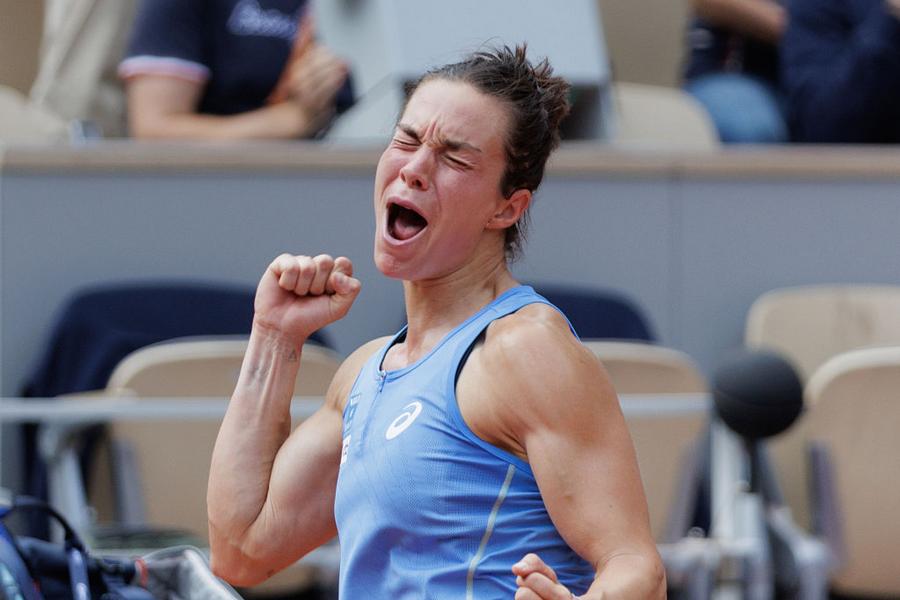Lois Boisson walked onto Court Philippe-Chatrier earlier today as a virtual unknown. Ranked No. 361 in the world, the 22-year-old French wild card was given no realistic shot against her fourth-round opponent, Jessica Pegula, the No. 3 player in the world.
Two and a half hours later, Boisson walked off the court a national hero and a half-millionaire. With her shocking 3-6, 6-4, 6-4 victory, Boisson didn't just pull off one of the biggest upsets in French Open history. She more than tripled her career prize money in a single afternoon.
Before the match, Boisson's total career earnings stood at just $148,009. By reaching the quarterfinals, she is now guaranteed a payday of $500,284. If she beats 18-year-old Russian prodigy Mirra Andreeva in the next round, she's guaranteed to walk away with at least $784,269. And if the Cinderella run continues all the way to a championship, Boisson would take home the tournament's top prize of $2,897,947. That would be roughly 20 times her total lifetime earnings before this week.

(Photo by Tnani Badreddine/DeFodi Images/DeFodi via Getty Images)
From $462 Paydays to Prime Time Glory
Boisson's journey to this moment is as improbable as the win itself. One year ago, she wasn't even sure she would play professional tennis again. A torn knee ligament just before the 2024 French Open left her sidelined and uncertain. When she did return, she had to grind her way through the tennis wilderness. She entered low-level tournaments, stayed in cheap hotels, and played for modest paydays. In February, she left a minor event in Manchester with $462 in prize money.
She had never played a top-20 opponent before today. She had never played on Roland-Garros' main stage. And yet, with the home crowd roaring behind her, she seized the biggest moment of her young career. The win made Boisson the lowest-ranked woman to reach a Grand Slam quarterfinal since Kaia Kanepi at the 2017 U.S. Open.
The Wild Card That Changed Everything
Boisson wouldn't even be in the French Open if not for a wild card. Her world ranking of 361 was far too low to qualify for the main draw outright. But tournament organizers took a chance on the French native, and that decision has now paid off in historic fashion.
Boisson's playing style proved particularly effective on clay. Her high-bouncing topspin forehand kept Pegula off balance, and she showed nerves of steel in the final set, converting a crucial break after four tense attempts. Pegula, who was a finalist at last year's U.S. Open and a consistent top-10 player, admitted after the match that she failed to capitalize on key opportunities.
Next Up: Mirra Andreeva
Standing between Boisson and the semifinals is teenage sensation Mirra Andreeva, the 18-year-old Russian who currently ranks #6 in the world. Heading into the French Open, Mirra Andreeva's career prize money stood at $5,639,551, placing her among the top 150 all-time WTA earners at just 18 years old.
Mirra has had an incredibly impressive 2025 season, securing two WTA singles titles, including victories at the Dubai Tennis Championship and the Indian Wells Open.
But Boisson now has the crowd, the momentum, and a lot more prize money on the line.
A loss would still be the biggest win of Boisson's career, financially and professionally. A win would push her earnings past the $1.4 million mark and put her two matches away from becoming one of the most unexpected Grand Slam champions in modern tennis history. And she would be doing it all in front of a roaring home crowd. A true Cinderella sports story.
Update: June 5
Lois did indeed end up beating Mirra Andreeva in two sets. Unfortunately, her Cinderella story came to an end today with a loss against Coco Gauff (6-1, 6-2). For reaching the semifinals, Lois walks away with $784,269.15. That's 5x her career earnings coming into the match.
/2022/09/Jessica-Pegula.jpg)
/2011/03/ew.jpg)
/2015/08/Dominika-Cibulkova.jpg)
/2022/09/Frances-Tiafoe.jpg)
/2010/06/Mary-Pierce.jpg)
/2014/08/GettyImages-615700682.jpg)
:strip_exif()/2015/09/GettyImages-476575299.jpg)
/2020/01/lopez3.jpg)
:strip_exif()/2009/09/P-Diddy.jpg)
/2019/11/GettyImages-1094653148.jpg)
/2017/02/GettyImages-528215436.jpg)
/2020/04/Megan-Fox.jpg)
/2019/10/denzel-washington-1.jpg)
/2020/06/taylor.png)
/2019/04/rr.jpg)
/2009/09/Jennifer-Aniston.jpg)
/2009/11/George-Clooney.jpg)
/2018/03/GettyImages-821622848.jpg)
/2020/02/Angelina-Jolie.png)
/2009/09/Brad-Pitt.jpg)
/2009/09/Cristiano-Ronaldo.jpg)